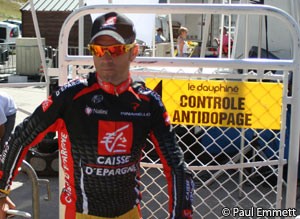Banned from competition until 2012
 Caisse d’Epargne’s Alejandro Valverde has been handed down a global ban for his involvement with the Operacion Puerto blood doping scandal.
Caisse d’Epargne’s Alejandro Valverde has been handed down a global ban for his involvement with the Operacion Puerto blood doping scandal.
After a long deliberation, the Court of Arbitration for Sport (CAS) has ruled in favor of the International Cycling Union (UCI) and World Anti-Doping Agency’s (WADA) joint appeal to sanction the rider based on DNA tests performed by the Italian Olympic Committee (CONI).
CONI took blood samples from Valverde when the Tour de France crossed the Italian border during the 2008 edition of the race. It then compared and matched his DNA with the contents of blood bag number 18 that was seized during the Operación Puerto raids, resulting in a suspension that, until today, was only effective in Italy.
Valverde, 30, will have to serve a ban that lasts until January 2012, but the court has refused to annul Valverde’s recent results that include his Vuelta a Espana win last year.
“The CAS has partially upheld the appeals filed by the International Cycling Union (UCI) and the World Anti-Doping Agency (WADA) against the Spanish Cycling Federation (RFEC) and the Spanish cyclist Alejandro Valverde,” CAS said in a statement.
“Accordingly, the CAS has imposed a two-year ban on Alejandro Valverde starting on 1 January 2010 but has denied the request of the UCI and WADA that results obtained by the athlete prior to the beginning of the suspension be annulled.”
The scientific evidence provided by CONI was sufficient for CAS to rule that Valverde had committed an anti-doping rule violation.
The UCI’s rules allow them to convert any other national federation’s ban to a global ban, which could have prevented the Spaniard from competing until May of next year. The UCI decided to await the decision on a CAS appeal to force the Spanish federation to impose its own global suspension. Having the Spanish federation take disciplinary has now resulted in something closer to a full two-year global ban.